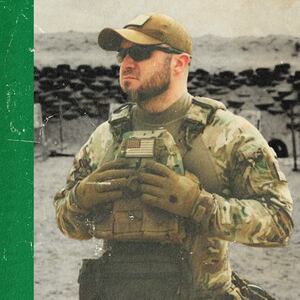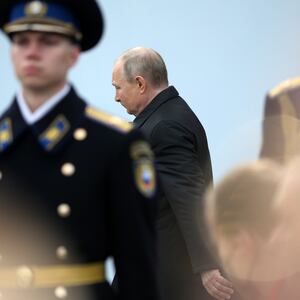Last year, a man claiming to be a Russian soldier fighting in Moscow’s war in Ukraine started posting triumphant videos from what he claimed was the battlefield on a Chinese social media app, applauding Russian fighting and calling for a Kremlin victory.
But things started to get fishy when the supposedly Russian soldier peddling anti-American and pro-Kremlin narratives around the war had impeccable Chinese pronunciation in his videos, according to the South China Morning Post.
When the account started suggesting that its fans buy allegedly Russian products from him—including vodka, beer, and milk powder—social media users began ferreting out signs that the account was likely a fraud.
The social media account, called “Pavel Korchati,” ran the scheme on Douyin, the Chinese version of TikTok, spinning numerous fake stories that appear aimed at stoking anti-American sentiment. In one case, he stood in front of what he said was a power plant, where he claimed to have captured a U.S. military adviser.
The account has claimed to battle the U.S. military in Ukraine, as well, without providing any evidence to back up the claim. (Even though some Americans have volunteered to fight in the war on behalf of Kyiv, as The Daily Beast has reported, the United States has officially said that it does not have boots on the ground in Ukraine.)
In addition to his pronunciation, some users noted that the IP addresses the supposed Russian fighter was using were in the Henan province inside China, according to The Straits Times. Users noted that this matched his accent as well. Some of the places the user filmed himself he claimed were in Ukraine were actually in Henan, the South China Morning Post reported.
Douyin has since banned the account, but the entire saga has raised concerns about growing Russian influence and pro-Moscow propaganda proliferating online in China.
Before Douyin nixed the account, users on the app were able to chime in with “Pavel” and wish Russia well, expressing sentiments that appeared aimed at boosting the Moscow-Beijing alliance.
“Please take care and be safe, brother from Russia,” one user commented, according to Rest of World. “Long live Russia-China friendship!”
It’s not just “Pavel,” either. Other users have posted videos claiming to be from Russian soldiers fighting in the war, according to Douyin.
The fraudulent accounts are the latest layer of the complicated information space Beijing and Moscow share around war and conflict.
Beijing’s reaction to Russia’s war in Ukraine has been mixed since Russia invaded last year. At first, Xi Jinping was caught off guard by the way Russian President Vladimir Putin was conducting the war in Ukraine, according to a U.S. intelligence community assessment.
China has officially claimed that it is neutral in the war, and has sought to step into a mediator role for the conflict, issuing a so-called peace plan earlier this year.
But between the lines, Beijing’s message and actions lean pro-Russia. Beijing has been providing nonlethal aid to Russia to aid the war effort, according to the State Department. And although Beijing branded its proposal as a peace plan, it leaned into Moscow’s narrative of territorial expansion and lacked stipulations that would have Russian troops withdraw from Ukrainian territory. (Putin himself has praised the plan.)
Chinese state media outlets have adopted the Russian terminology for the war as well, calling it a “special military operation” instead of a war, like the Kremlin. They have backed up fake Russian accusations that the United States was funding biological weapons in Ukraine and blamed the U.S. government as the instigator behind the war.
“When the U.S. drove five waves of NATO expansion eastward all the way to Russia’s doorstep and deployed advanced offensive strategic weapons in breach of its assurances to Russia, did it ever think about the consequences of pushing a big country to the wall?” a Chinese Foreign Ministry spokesperson asked last year?
For Putin and Xi, who share strong sentiments that the United States’ unipolar power must be countered on the world stage, a shared information space is likely to continue to thrive.
China has been working to align other countries with Russian messaging on the war in Ukraine. Earlier this year, China asked foreign embassies in China to avoid displaying “political propaganda” at a time when the only signs at Western embassies were those signs supportive of Ukraine, according to EuroNews.
China spends billions of dollars on spreading disinformation, including pro-Russian propaganda about the war in Ukraine, the Biden administration’s special envoy on countering disinformation James Rubin said earlier this year.
“In the communication space, the alignment between China and Russia is near complete,” Rubin said, admitting that the State Department is likely lagging behind in combatting misinformation.
“We as a nation and the West have been slow to respond, and it is a fair judgment that we are facing a very, very large challenge,” he said.
Not everyone in China feels the same nationalistic sentiments about the war in Ukraine, as The New York Times has reported.
The propaganda overlaps between China and Russia aren’t limited to war topics. Another apparent fake propaganda account from a user in China, which went by the account handle “Russian Babushka” (the Russian word for grandma) has been accused of using face-swapping technology to pose as a Russian woman praising Chinese culture, according to The China Project.
Social media users in China have, in some cases, latched onto Russian propaganda about Putin and his manliness and strength in recent months during the war as well, calling him “handsome daddy” and noting that “Daddy Putin is the best,” according to Foreign Policy.








